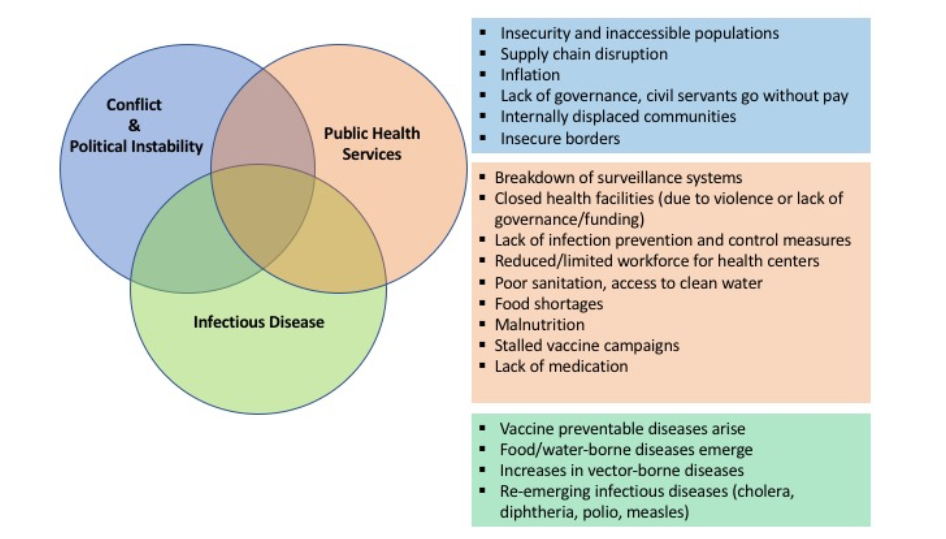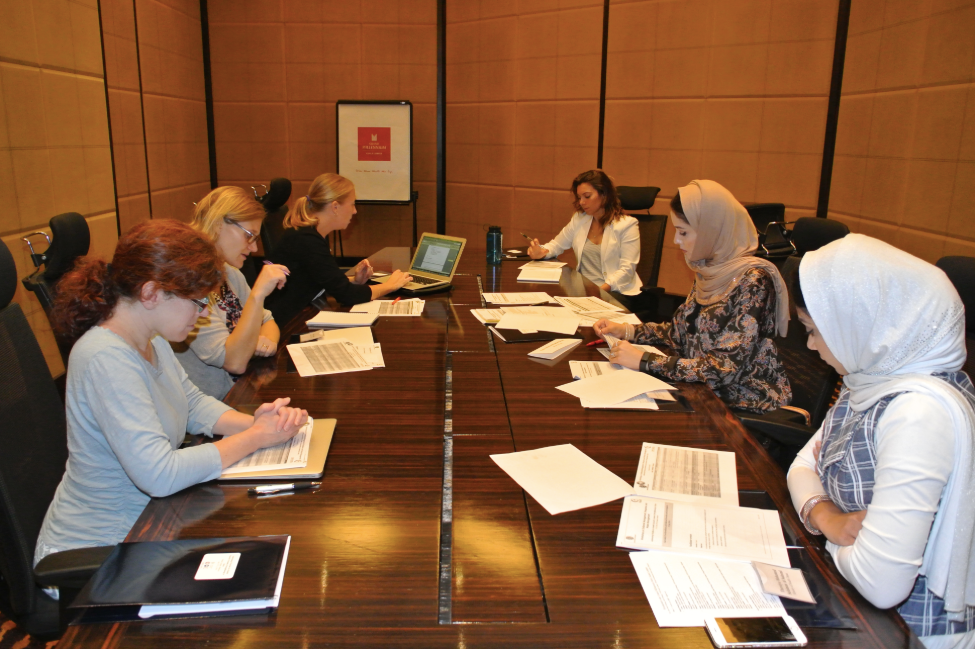Infectious Diseases, Conflict, and Humanitarian Crises
Overview
Infectious diseases and humanitarian crises frequently go hand in hand. Many historical epidemics have been associated with natural or manmade disasters, such as the cholera outbreak that has plagued Haiti since 2010, which hit as the country was still reeling from the aftermath a major earthquake. Conflict and political instability represent special and particularly challenging forms of humanitarian emergencies, with unique opportunities for the emergence and spread of infectious diseases. For example, forced displacement of communities can exacerbate transmission and/or introduce disease to new areas. Disruption of supply chains and emigration lead to shortages of medication, reagents and trained medical personnel, as well as a breakdown in routine health services such as vaccination. Destruction of infrastructure can not only reduce direct access to health services and care, but can create new environmental conditions and habitats that facilitate the spread of vector-borne and zoonotic diseases. Finally, direct injuries sustained by civilians as well as combatants during times of war can further burden already weakened health systems, and lead to a host of subsequent health challenges, including wound infections, antibiotic resistance, and psychosocial trauma.

The influence of political instability and conflict on the emergence and spread of infectious diseases during humanitarian crises has been evident in recent years. For example, the devastating cholera outbreak first reported in Yemen in 2016 can be directly linked to Saudi airstrikes on civilian power and water infrastructure, and was exacerbated by existing strains on the population and health system, such as wide-spread starvation and malnutrition, destruction of primary health care centers, and lack of medical supplies and personnel. The disruption of routine vaccination services in Syria, due to the civil war on-going since 2011, resulted in re-emergence of wildtype poliovirus in 2013, later declared a Public Health Emergency of International Concern by the WHO in 2014. Most recently, the notification of a new outbreak of Ebola virus in eastern Democratic Republic of Congo, in a region long affected by conflict and with correspondingly weak health systems, has already caused widespread concern, and proven challenging to contain.
Our team at the Center for Global Health Science and Security at Georgetown University is interested in operational and implementation research questions related to sustainable health systems strengthening, with an emphasis on the prevention, management, and control of infectious diseases in humanitarian situations, and particularly countries and regions affected by conflict.
Health security support for Libya
Libya faces perennial challenges of sustaining health security capabilities alongside civil unrest, political instability, and terrorism. In situations like Libya’s there is a need for creative, flexible and innovative implementation approaches when it comes to health systems strengthening. With funding support from the U.S. Department of State Georgetown’s Center for Global Health and Security (CGHSS) is partnering with the Libyan National Centre for Disease Control (NCDC) and the National Centre for Animal Health (NCAH) on two distinct projects. The first is to develop laboratory capacity across key public health and veterinary laboratories to improve biorisk assessments and policies as well as waste management practices. The second is to map existing capacities for rapid detection and response for priority zoonoses and work towards the establishment of One Health Rapid Response Teams (OH-RRTs).
These projects prevent duplication across NCDC and NCAH and allow for improved capacity and expanded geographical range to detect priority zoonotic diseases and work under safe laboratory environments in high risk/high threat areas of Libya.

Identifying infectious disease research priorities in areas affected by conflict
The complexity of the interlinkages between conflict, food and water insecurities, and infectious disease transmission require innovative approaches to find contextually appropriate, sustainable, and evidence-based solutions. To date, research on infectious disease interventions, and how best to improve them, in humanitarian and conflict settings has been lacking. Identifying these research priorities, and ensuring they are sensitive to the needs and challenges of vulnerable target populations, requires collaborative thinking and action among representatives from academia, humanitarian organizations, government entities, and others.
With funding support from the Georgetown University (GU)’s Global Health Initiative, and in collaboration with the Jordan University of Science and Technology (JUST), GU’s Center for Global Health and Security (CGHSS) is working to convene different stakeholders to identify research priorities related to infectious disease control in humanitarian and conflict settings. This has included hosting a one-day workshop on May 9, 2018 in Amman, Jordan which brought together representatives from regional and international academic, governmental, and humanitarian partners who work on public health issues within refugee and migrant populations, particularly in conflict-affected areas. A summary workshop report is provided below, under Publications.
These projects also relate to other efforts supported by our team, such as our work focused on policy analysis of the response to deliberate biological events and several undergraduate and graduate-level academic courses we have developed that explore the relationship between infectious diseases, conflict, and foreign policy.
Developing methodologies to support Joint External Evaluations (JEE) in crisis countries
The ability to deal with a catastrophic public health event relies on strong health infrastructure and robust collaboration across sectors. The risk of a national event becoming a global concern is amplified when national capacities to detect, report, and respond to a potential pandemic are obstructed by political instability and conflict. Our team, with support from the Open Philanthropy Project is reviewing current mechanisms in place for implementing the JEE in WHO designated crisis countries. We plan to establish a “crisis methodology” that will allow for a robust, evidence-based review to identify critical gaps and develop a clear action plan that can be validated by key stakeholders, adapted post-conflict, and may be used for countries in crisis.
Publications
Georgetown Center for Global Health Science and Security. Establishing Infectious Disease Research Priorities in Areas Affected by Conflict. Report funded by the Georgetown University Global Health Initiative. May 2018.


